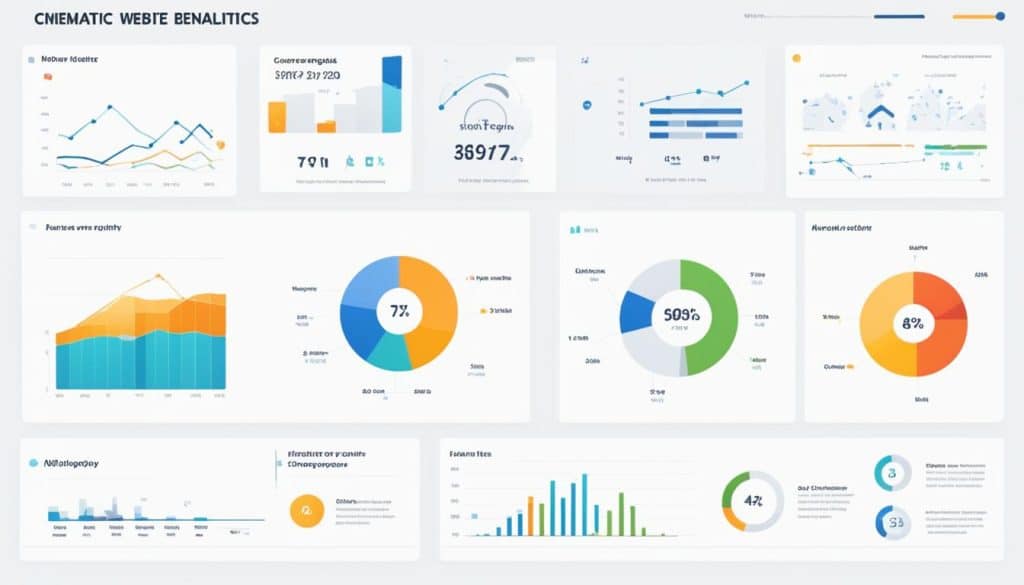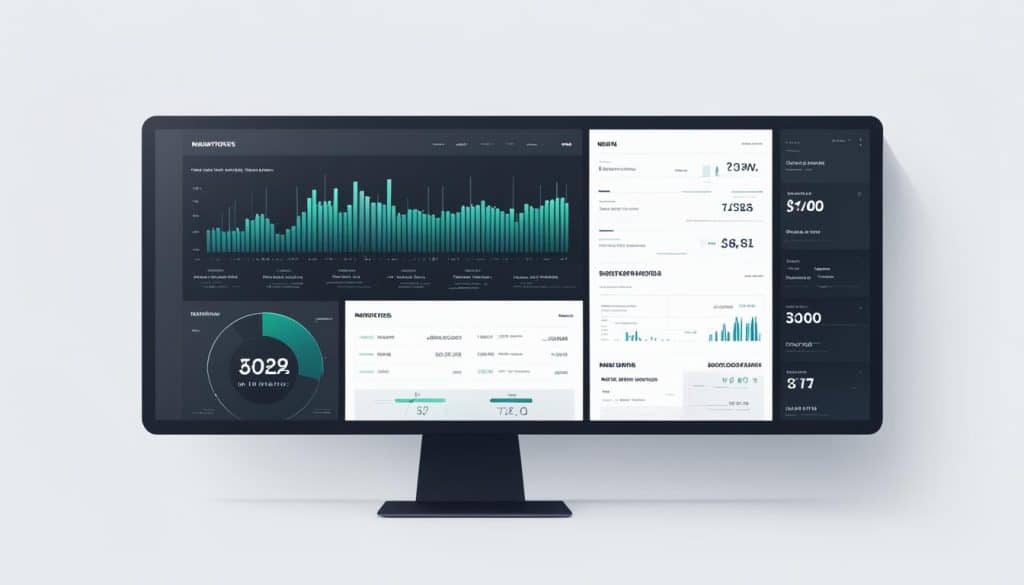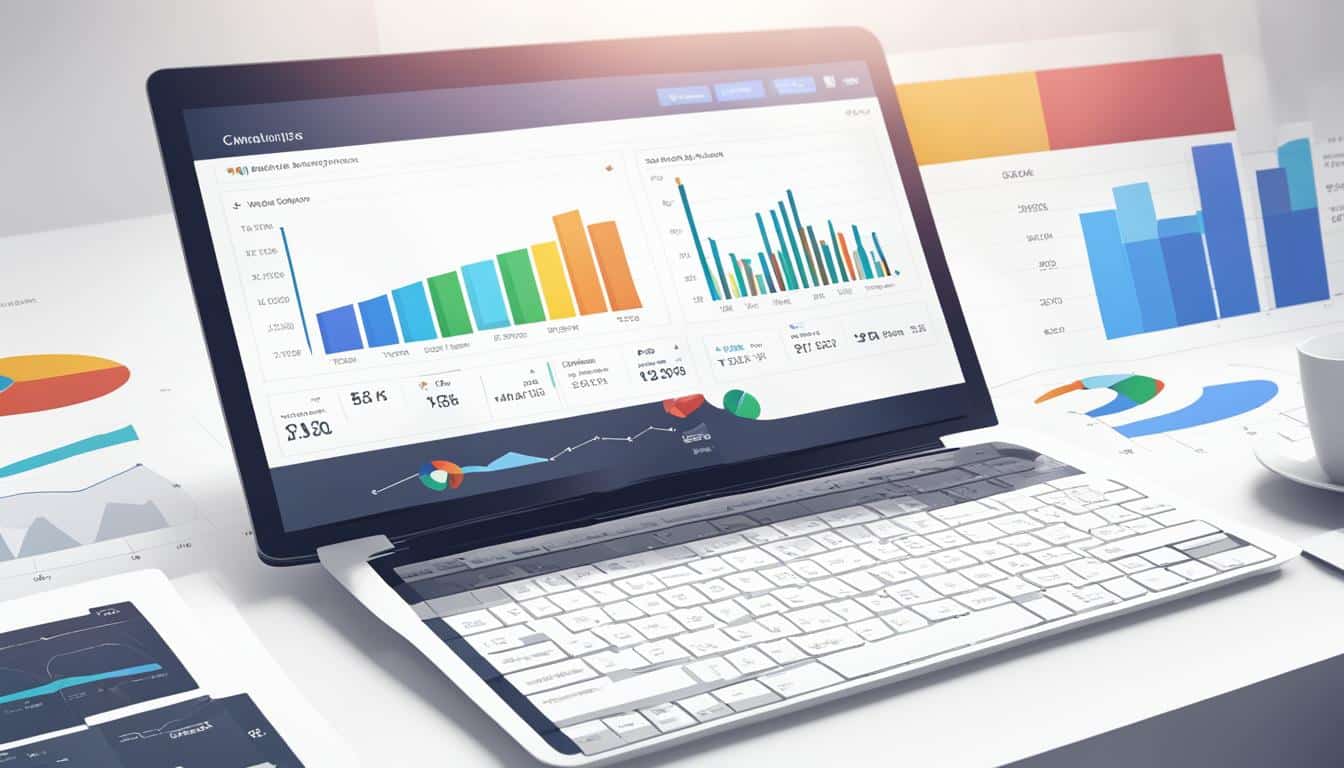Understanding Google Analytics is key to improving your website. It gives you insights into who visits your site, how they behave, and traffic sources. This info helps you make data-driven decisions to enhance user experience and boost conversions.
Knowing your traffic sources also shows you which channels bring in the most visitors. This lets you spend your marketing budget wisely. Using Google Analytics to its fullest can help your website reach its full capacity and meet your business goals.
Key Takeaways:
- Google Analytics provides essential data for website analysis and optimization.
- By understanding visitor behavior and traffic sources, you can make informed marketing decisions.
- Maximizing website visitor insights helps tailor strategies to meet audience needs.
- Setting up Google Analytics involves creating an account and installing the tracking code.
- Exploring key metrics in Google Analytics helps analyze website performance.
The Importance of Maximizing Website Visitor Insights
Knowing how website visitors behave is key to improving your online presence. Website analytics tools like Google Analytics offer insights into who visits your site, how they find it, and what they do there. This information helps you make smart choices to enhance user experience, find areas to improve, and boost conversions.
Google Analytics is a top choice for tracking data, analyzing website performance, and understanding your audience. It gives detailed reports on website traffic, user behavior, and more. This lets you dive into the data and find insights that guide your digital strategy.
Maximizing User Experience with Website Analytics
Improving user experience is a big part of maximizing website visitor insights. By looking at user behavior and website performance, you can spot where your site might be lacking. Making your site easy to navigate, responsive, and engaging are all ways to improve user experience.
Website analytics help you find out where users drop off, have high bounce rates, and other signs of a bad user experience. With this info, you can make data-driven decisions to improve your site. This leads to more engagement, longer visits, and more conversions.
Analyzing Traffic Sources for Effective Marketing Campaigns
Website analytics also show you where your traffic comes from. Knowing how users find your site helps you see how well your marketing works and where to focus your efforts.
If most of your traffic comes from organic search, you might want to boost your SEO efforts. On the other hand, if paid ads are bringing in a lot of traffic, you can work on making your ads more effective.
Uncovering Engaging User Behavior Patterns
Website analytics also reveal insights into user behavior patterns. By looking at metrics like time on page, click-through rates, and conversion rates, you can understand what drives your audience. This helps you tailor your strategies to meet their needs.
For example, if you notice many users add items to their cart but don’t complete the purchase, you can use analytics to find out why. You might send cart abandonment emails or simplify the checkout process to improve conversions.

| Key Insights from Website Analytics | Benefits |
|---|---|
| Identifying top traffic sources | Optimize marketing efforts and budget allocation |
| Monitoring user behavior patterns | Improve website usability and conversion rate |
| Tracking conversions and goal completions | Evaluate the effectiveness of marketing campaigns |
| Measuring website performance metrics | Identify areas for improvement and optimize site speed |
By using website analytics, you can improve your site to meet your audience’s needs. This boosts your site’s performance and helps you reach your digital marketing goals. With the right tools and data analysis, you can make data-driven decisions for long-term success.
Setting Up Google Analytics
Setting up Google Analytics is key to unlocking your website’s full power. This tool gives you insights into your audience’s behavior and demographics. Here’s how to start:
- Sign up for a Google Analytics account: Go to the Google Analytics website and create an account with your Google credentials.
- Generate a unique tracking code: After setting up your account, Google Analytics will give you a unique tracking code.
- Install the tracking code on your website: Copy the code and add it to your website’s HTML, right before the closing tag.
With the tracking code in place, Google Analytics will start collecting data. This includes your visitors’ demographics, location, and browsing habits. By linking Google Analytics to your site, you gain access to valuable information. This can help shape your marketing strategies and website optimization efforts.
Here’s an example of what the tracking code looks like:
Note: Replace “UA-XXXXXXXXX-X” with your unique tracking code.
<script async src=”https://www.googletagmanager.com/gtag/js?id=UA-XXXXXXXXX-X”></script> <script> window.dataLayer = window.dataLayer || []; function gtag(){dataLayer.push(arguments;} gtag(‘js’, new Date()); gtag(‘config’, ‘UA-XXXXXXXXX-X’); </script>
By using Google Analytics, you get the data needed for informed decisions. This helps optimize your website for better performance and user engagement.

Exploring Key Metrics in Google Analytics
Google Analytics offers many key metrics to help understand your website’s performance. By looking at these metrics, you can make smart decisions to improve your site. Let’s explore some of the most critical ones:
Traffic Sources
It’s important to know where your website traffic comes from. Google Analytics helps you see the different sources, like organic search, social media, and paid ads. This info lets you focus on the best ways to reach your audience.
Audience Demographics
Knowing who visits your site is key to creating content they’ll love. Google Analytics gives insights into your visitors’ age, gender, location, and interests. This helps you tailor your content to your audience, making it more engaging.
User Behavior Analysis
Understanding how users interact with your site is vital. Google Analytics offers data on page views, bounce rates, and time on site. By analyzing this, you can spot areas for improvement, making your site better for users and boosting conversions.

Google Analytics lets you uncover valuable insights from your website data. This helps you make smart choices to boost your success. You can look at where your traffic comes from, audience demographics, and how users behave.
This information helps you tailor your website to better meet your audience’s needs. You can make it more appealing and engaging for them.
| Metric | Description |
|---|---|
| Traffic Sources | Identify the channels driving traffic to your website, such as organic search, social media, and paid advertising. |
| Audience Demographics | Understand the characteristics of your website visitors, including their age, gender, location, and interests. |
| User Behavior Analysis | Analyze how users interact with your website, including page views, bounce rates, time on site, and conversions. |
Optimizing Website Performance with Google Analytics
Google Analytics is a powerful tool that can help you optimize your website’s performance. By leveraging its capabilities, you can enhance user experience, identify and fix website errors, track conversions, and monitor site speed. These optimizations play a crucial role in improving your website’s overall performance and maximizing its SEO potential.
One of the key aspects of website optimization is focusing on user experience. Ensuring that your website is user-friendly, with clear navigation and a responsive design, can significantly improve the overall satisfaction of your visitors. By making it easy for users to navigate through your site and find the information they need, you can increase engagement and encourage repeat visits.
Another important step in optimizing website performance is identifying and fixing website errors. These errors can include broken links, missing pages, slow-loading images, or any other issues that may impact user experience. Regularly auditing your website using Google Analytics can help you identify these errors and take appropriate actions to rectify them, ensuring a smooth and seamless browsing experience for your users.
Conversion tracking is another valuable feature offered by Google Analytics. By setting up conversion goals, you can track user interactions that align with your business objectives, such as completing a purchase or filling out a contact form. This data allows you to analyze the conversion funnel and identify areas for improvement, enabling you to optimize your website’s conversion rate and drive more valuable actions from your visitors.
Monitoring site speed is an integral part of website optimization. Studies have shown that a slow-loading website can significantly impact user experience and increase bounce rates. Google Analytics provides insights into your website’s page load times, allowing you to identify any performance bottlenecks that may be affecting your site’s speed. By optimizing site speed, you can provide a seamless browsing experience, improve user satisfaction, and boost your search engine rankings.
Benefits of Optimizing Website Performance with Google Analytics:
- Improved user experience through a user-friendly design and clear navigation
- Enhanced website performance by identifying and fixing website errors
- Increased conversions through effective conversion tracking and analysis
- Improved search engine rankings by optimizing site speed
With Google Analytics as your ally, you have the tools and insights needed to optimize your website’s performance and maximize its SEO potential. By prioritizing user experience, fixing website errors, tracking conversions, and monitoring site speed, you can achieve higher engagement, increased conversions, and better overall website performance.

| Website Optimization Strategies | Benefits |
|---|---|
| Implementing a responsive design | Enhanced user experience and increased mobile traffic |
| Fixing broken links and errors | Improved user satisfaction and search engine rankings |
| Setting up conversion tracking | Insights into user behavior and optimization of conversion rate |
| Optimizing site speed | Reduced bounce rates, improved user experience, and better search engine rankings |
How to Use Google Analytics Tips and Tricks
Google Analytics has many tips and tricks to help you use it better. By using these techniques, you can understand your website’s data deeper. This way, you can make smart decisions to improve your site’s performance. Here are some great tips and tricks to boost your Google Analytics skills:
1. Switch Up Views
Google Analytics lets you create multiple views for your data. This way, you can look at your data from different angles. For instance, you can have one view for each marketing channel or for specific website sections.
This helps you understand your website better. You can find out where you need to improve.
2. Set Custom Alerts
Custom alerts in Google Analytics are great for keeping an eye on your website’s data. You can set alerts for important metrics like traffic, bounce rate, or conversion rate. This way, you’ll know right away if something’s off.
Then, you can quickly check what’s happening and fix it if needed.
3. Measure Site Speed
Website speed is key for a good user experience and SEO. Google Analytics shows you how fast your site loads. By looking at this data, you can find slow spots and make your site faster.
Fast sites make users happy, lower bounce rates, and help with SEO rankings.
4. Create Goals and Events
Goals and events in Google Analytics help you track important actions on your site. Goals let you measure things like form submissions or e-commerce sales. Events track actions that might not lead to a sale, like button clicks or video views.
By setting up goals and events, you get valuable insights. This helps you make your website and marketing better at getting conversions.
| Key Google Analytics Tips and Tricks | Description |
|---|---|
| Switch Up Views | Create multiple views in Google Analytics to analyze data from different perspectives, gaining a comprehensive understanding of website performance. |
| Set Custom Alerts | Create custom alerts in Google Analytics to receive notifications of significant changes or anomalies in key performance metrics, allowing for immediate action. |
| Measure Site Speed | Analyze website speed data in Google Analytics to identify and optimize areas with slow loading times, improving user experience and search engine rankings. |
| Create Goals and Events | Set up goals and events in Google Analytics to track specific user interactions, such as conversions, button clicks, or document downloads, providing insights for optimization. |
By implementing these Google Analytics tips and tricks, you can unlock the full potential of this powerful tool and make data-driven decisions to optimize your website’s performance. Whether it’s analyzing data from different views, setting up custom alerts, measuring site speed, or tracking goals and events, Google Analytics provides the necessary insights to enhance your data analysis capabilities. Use these tips and tricks to gain deeper insights into your website’s performance and drive meaningful improvements.
The Role of Google Analytics in SEO
Google Analytics is key for making your website better for search engines. It shows you how your site is doing and where you can get better. With Google Analytics, you can see organic traffic, check keyword performance, watch backlinks, and look at site speed. This helps you make your site better.
Tracking Organic Traffic
Google Analytics lets you track organic traffic. This means visitors who find your site through search engines. By looking at this data, you learn which keywords and search engines bring the most visitors. This info helps you make your site more attractive to search engines.
Analyzing Keyword Performance
Google Analytics helps you see how well your keywords are doing. It shows which keywords bring the most visitors and sales. Knowing this, you can focus on improving those keywords. This makes your content better and brings more visitors to your site.
Monitoring Backlinks
Backlinks are important for SEO because they show your site’s credibility. Google Analytics lets you keep an eye on these backlinks. By tracking them, you can see if your link building is working. This helps make your site more trusted by search engines.
Measuring Site Speed
Site speed is very important for SEO because it affects how users feel about your site. Google Analytics shows you how fast your site loads. If it’s slow, you can fix it. This makes your site better for users and search engines.
Google Analytics helps you make smart choices to improve your site for search engines. By tracking organic traffic, analyzing keywords, watching backlinks, and checking site speed, you can get more visitors and rank higher. It’s a powerful tool for making your site successful.
Key Benefits of Google Analytics in SEO
| Benefit | Description |
|---|---|
| Track Organic Traffic | Identify keywords, search terms, and search engines driving traffic to your site |
| Analyze Keyword Performance | Evaluate the effectiveness of keywords and optimize content strategy |
| Monitor Backlinks | Track the quantity and quality of backlinks directing traffic to your website |
| Measure Site Speed | Identify and address performance issues to improve user experience and search engine rankings |
Analyzing SEO Performance with Google Analytics
After setting up Google Analytics for SEO, it’s key to check your website’s performance. Look at metrics like organic traffic, bounce rate, conversion rate, keyword performance, and site speed. These insights help you see how well your SEO is working and where you can get better.
Key Metrics for SEO Performance Analysis
When you’re checking your website’s SEO performance, focus on these important metrics:
- Organic Traffic: This shows how many visitors find your site through search engines. It tells you if your SEO is bringing in the right people.
- Bounce Rate: This is how many visitors leave after seeing just one page. A high bounce rate might mean your content isn’t grabbing their interest.
- Conversion Rate: This shows how many visitors do what you want them to, like buying something or signing up. A good conversion rate means your site is working well.
- Keyword Performance: This helps you see which keywords are bringing in traffic and sales. You can then focus on the best keywords and work on the ones that aren’t doing well.
- Site Speed: How fast your site loads is important for both users and search engines. Slow sites can scare people away and hurt your rankings. Checking site speed helps you find and fix any speed issues.
By analyzing these metrics within Google Analytics, you can gain actionable insights into your website’s SEO performance and make data-driven decisions to optimize your strategies for better search engine rankings and increased organic traffic.
| Metric | Definition | Importance |
|---|---|---|
| Organic Traffic | The number of visitors who arrive at your website through organic search results | Indicates the effectiveness of SEO efforts in driving relevant traffic |
| Bounce Rate | The percentage of visitors who leave your website after viewing only one page | High bounce rate may indicate content relevance or engagement issues |
| Conversion Rate | The percentage of visitors who take a desired action on your website | Measures the effectiveness of converting visitors into customers or leads |
| Keyword Performance | The performance of targeted keywords in driving traffic and conversions | Helps optimize keyword strategies for better SEO results |
| Site Speed | The time it takes for your website to load | Affects user experience and search engine rankings |
Analyzing these metrics provides valuable insights into the effectiveness of your SEO efforts and helps you identify areas for improvement. By optimizing your website based on these insights, you can enhance your search engine visibility, attract more organic traffic, and ultimately improve your online business performance.
Conclusion
Google Analytics is a key tool for boosting your website’s SEO performance. It helps you understand your website’s strengths and weaknesses. This knowledge lets you improve your search rankings, attract more visitors, and boost sales.
By keeping an eye on Google Analytics data, you can make smart choices. You’ll learn about your visitors’ habits and what brings them to your site. This info helps you tailor your content to meet their needs.
Remember, improving your website is a never-ending task. Search engines and user habits change often. Google Analytics gives you the tools to stay ahead and reach your goals.
FAQ
What is Google Analytics?
Google Analytics is a web analytics tool. It shows you how your website is doing. It tracks things like who visits, what they do, and how they find your site.
Why is Google Analytics important?
Google Analytics is key because it offers deep insights into your visitors. It helps you understand their behavior and where they come from. This knowledge lets you improve your site and attract more visitors.
How do I set up Google Analytics?
To start with Google Analytics, create an account and get a tracking code. Add this code to your website’s pages. This lets you track visitor data and learn about your audience.
What key metrics can I analyze with Google Analytics?
Google Analytics lets you check important metrics like traffic sources and audience demographics. These insights help you see where your visitors come from and how to improve their experience.
How can I optimize my website’s performance with Google Analytics?
Google Analytics helps you make your website better. It shows you how to improve user experience and fix problems. By doing this, you can boost your site’s performance and attract more visitors.
What are some tips and tricks for using Google Analytics?
Google Analytics has many tips to help you use it well. You can switch views, set goals, and track site speed. These tricks save you time and help you understand your website’s performance better.
How does Google Analytics impact SEO?
Google Analytics is vital for SEO. It gives you insights into your website’s performance. By tracking organic traffic and site speed, you can improve your search rankings.
What should I analyze in Google Analytics for SEO purposes?
For SEO, look at metrics like organic traffic and keyword performance. Analyzing these helps you spot areas for improvement. This way, you can make your website more appealing to search engines.
How can Google Analytics help maximize my website’s SEO performance?
Google Analytics helps you boost your SEO by analyzing data and making improvements. By tracking your website’s performance, you can attract more visitors and increase sales. Regularly update your SEO strategy based on Google Analytics data for ongoing success.





